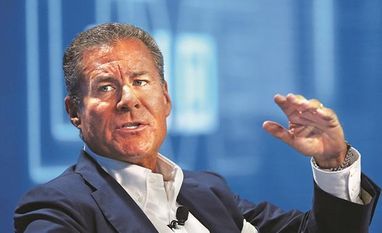Richard Plepler, the gregarious chief executive of HBO and one of the most influential executives in entertainment, abruptly stepped down on Thursday. His decision came eight months after AT&T acquired Time Warner, the network’s corporate home, in an $85.4 billion deal.
Plepler found he had less autonomy after the merger, according to two people familiar with his thinking.
HBO, under his watch, won more than 160 Emmys for series like “Game of Thrones,” “Big Little Lies” and “Veep.” From his office at the network’s Manhattan headquarters overlooking Bryant Park, Plepler, 60, had a strong hand in creating what is often referred to as television’s second golden age. He rose to prominence in a heyday for cable, and HBO’s Sunday night lineups showcased critically acclaimed hits like “The Sopranos,” “Sex and the City,” “Girls” and “Curb Your Enthusiasm.”
AT&T has been in talks with Robert Greenblatt, the former chairman of entertainment at NBC, for a high-level executive post at Warner Media, the division that oversees HBO under its Dallas-based minders. Before he ran programming at NBC, Greenblatt was in charge of entertainment at Showtime from 2003 to 2010, and oversaw shows like “Weeds” and “Nurse Jackie.” After reports of the talks surfaced, it seemed unlikely to those who know Plepler that he would be willing to report to his onetime competitor.
“Hard as it is to think about leaving the company I love, and the people I love in it, it is the right time for me to do so,” Plepler said in a memo to HBO employees on Thursday. He added, “I look forward over the coming weeks to thanking as many of you as I can for the thousands of contributions big and small that have made ‘this thing of ours,’ to quote Tony Soprano, so special.”
The industry in which Plepler thrived has been destabilised recently by the entry of big-spending digital rivals like Netflix and Amazon.
Their threat to old ways of creating entertainment helped set in motion the recent mega-mergers in media and entertainment. In addition to AT&T’s purchase of Time Warner, the Walt Disney Company is acquiring much of 21st Century Fox.
Plepler joined HBO as a public relations official in 1992, some years after serving as an aide to Christopher J. Dodd, then a United States senator from Connecticut. Before long, Mr. Plepler oversaw HBO’s communications department, but his position was greater than his title suggested. He became the face of HBO’s New York operation, playing a key role in programming decisions.
He moved into the role of co-president in 2007, after the network’s chief executive at the time, Chris Albrecht, resigned after being accused of assaulting his girlfriend. Plepler became chief executive in 2013 and continued to show a knack for picking material that pleased critics while also delivering the occasional cheap thrill.
During the early stages of AT&T’s acquisition of Time Warner, Plepler strongly suggested that he would not give up his independence during an interview at his usual lunch spot, a corner booth at the Lambs Club, a restaurant two blocks from his office. In order for HBO to thrive, he insisted, there would have to be “a Chinese wall” between the network and its Dallas-based bosses. He also wondered aloud why the AT&T chief executive Randall Stephenson would buy HBO if he had any plan that would involve “messing with a winning game.”
Plepler’s future came into clearer focus last June, when AT&T completed its acquisition of Time Warner, which was also the corporate home of the Warner Bros. movie studio and the cable networks CNN, TBS and TNT. Stankey addressed roughly 150 HBO employees during a town-hall meeting at the cozy HBO Theater on the 15th floor of the company’s New York headquarters. He warned them of a “tough year” ahead, saying that it “will feel like childbirth.”
Plepler shared the stage with Stankey that day, and there was a moment of public tension between them after the AT&T veteran promised more investment in HBO and Plepler interjected, “Let’s give him a hand for that simple sentence!”
Reclaiming the stage, Stankey said, “We’ve got to make money at the end of the day, right?”
“We do that,” Plepler responded.
“Yes, you do,” Stankey said. “Just not enough.”
There was laughter in the room, but his blunt statements did not sit well with some employees.
Profits rose during Plepler’s run as chief executive, topping more than $2 billion in 2017. He introduced a stand-alone app, HBO Now, in 2015, which has more than five million subscribers. As someone who had grown accustomed to running his own shop, he seemed to chafe under his new boss from the start. His departure shows that AT&T is likely to be an active steward of Warner Media, one that did not hesitate to disrupt a network that is the division’s crown jewel.
©2019 The New York Times News Service
Unlock 30+ premium stories daily hand-picked by our editors, across devices on browser and app.
Pick your 5 favourite companies, get a daily email with all news updates on them.
Full access to our intuitive epaper - clip, save, share articles from any device; newspaper archives from 2006.
Preferential invites to Business Standard events.
Curated newsletters on markets, personal finance, policy & politics, start-ups, technology, and more.
)